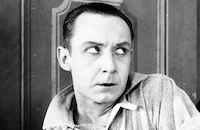I'll Take Romance

Brief Synopsis
Cast & Crew
Edward H. Griffith
Miss Grace Moore
Melvyn Douglas
Helen Westley
Stuart Erwin
Margaret Hamilton
Film Details
Technical Specs

Synopsis
James Guthrie and his pal, Pancho Brown, visit theatrical agent Will Kane because they are concerned that Madame Della is preventing her niece, opera singer Elsa Terry, from fulfilling a contract to perform in Buenos Aires, as she has received a better offer to sing in Paris. Guthrie and Pancho attend Elsa's performance in La traviata , but Guthrie is unable to meet her when he sneaks backstage between acts. The next day Guthrie deluges Elsa's apartment with candy and flowers, and that night he and Pancho attend her performance of Martha . Pancho is not the only one in the audience who is bored, and his game of dice becomes popular during the show. In order to meet Elsa, Guthrie rents an apartment next to hers. Elsa is friendly, and Guthrie even succeeds in making friends with the authoritarian Della. Guthrie and Elsa subsequently go out every night. Overhearing Guthrie tell Pancho that he will have to abduct Elsa if she will not go to Buenos Aires with him, she decides to refuse to go in order to enjoy being kidnapped. That night, Elsa tells Guthrie she has decided against going to Argentina with him, and she later allows herself to be put on the wrong boat with him. Guthrie has fallen in love with Elsa, but when she receives a telegram from Della explaining that Guthrie romanced her only to get her to sing in Argentina, she refuses to speak with him. Desperately, Guthrie abducts her again and takes her to his hacienda, but releases her in time for opening night. After the next performance, Pancho kidnaps Guthrie and takes him to the hacienda where Elsa, who realizes that they really love each other, is waiting for him.

Director
Edward H. Griffith
Cast
Miss Grace Moore

Melvyn Douglas

Helen Westley

Stuart Erwin

Margaret Hamilton

Walter Kingsford

Richard Carle
Ferdinand Gottschalk
Esther Muir
Frank Forest
Walter O. Stahl
Barry Norton
Lucio Villegas
Gennaro Curci
Marek Windheim

Franklin Pangborn
Greta Meyer
Albert Conti
Adia Kuznetzoff

George Andre Beranger

John Gallaudet
Ernest Wood
Marco Vico
Al Hill
Allan Garcia
Bruce Sidney
Mildred Gover
Bruce Wyndham
Alphonse Martell
Carrie Daumery
Bill Lally
George Hickman
Lew Davis
Marion "bud" Wolfe
Bing Conley
Louis Mercier
Meeka Aldrich
Mariska Aldrich
Irene Crane
Alex Palasthy
Genaro Spagnoli
Manuel Paris

Ann Doran
Mary Emery
Manuel Emanuel
Crew
Lucien Andriot
Stephen Morehouse Avery
Lionel Banks
Arthur Black
Harry Cohn
Marie Costa
Milton Drake
Friedrich Von Flotow
Friedrich Wilhelm Friedrich
Giuseppe Giacosa
Philippe Gille
Frank Goodwin
Stephen Goosson
Oscar Hammerstein Ii
Luigi Illica
Babs Johnstone
Kalloch
William Lyon
Jules Massenet
Henri Meilhac
Otto Meyer
Jane Murfin
Ben Oakland
George Oppenheimer
Francesco Maria Piave
Giacomo Puccini
Everett Riskin
Morris Stoloff
Isaac Van Grove
Giuseppe Verdi
Wilhelm Von Wymetal Jr.

Film Details
Technical Specs

Articles
I'll Take Romance
By Frank Miller

I'll Take Romance
Quotes
Trivia
Notes
This was the last American film of opera singer Grace Moore. She made one additional motion picture in France in 1939, entitled Louise. Moore died in a plane crash in 1947. Her life was the basis for the 1953 M-G-M film So This Is Love, directed by Gordon Douglas and starring Kathryn Grayson as Moore.














